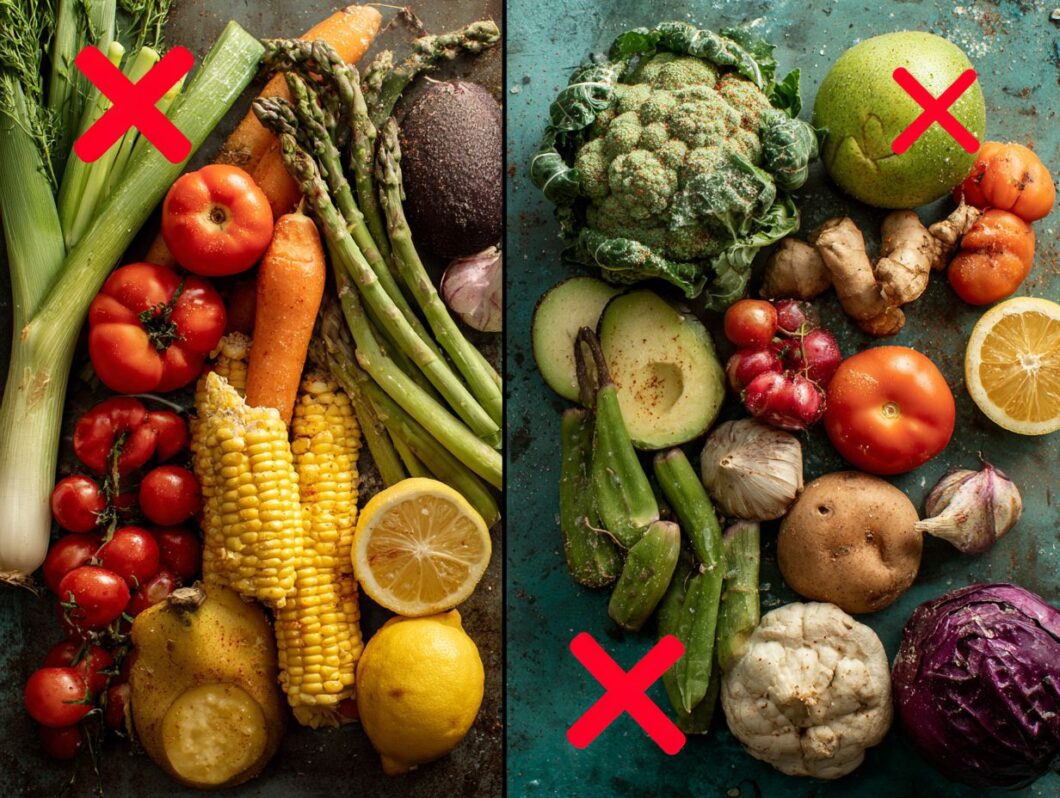When it comes to organic foods, many consumers assume they are free from harmful substances, but this isn’t always the case, especially when compared to conventional farming. According to the USDA and experts like Vani Hari, some organic ingredients can still harbor pesticide residue and other additives that don’t meet ideal nutrition standards. In this article, we’ll uncover the surprising ingredients you should avoid to truly maintain a healthy diet, ensuring your choices align with safe and beneficial eating practices and nutrition standards.
Key Takeaways:
Common Misconceptions About Organic Products
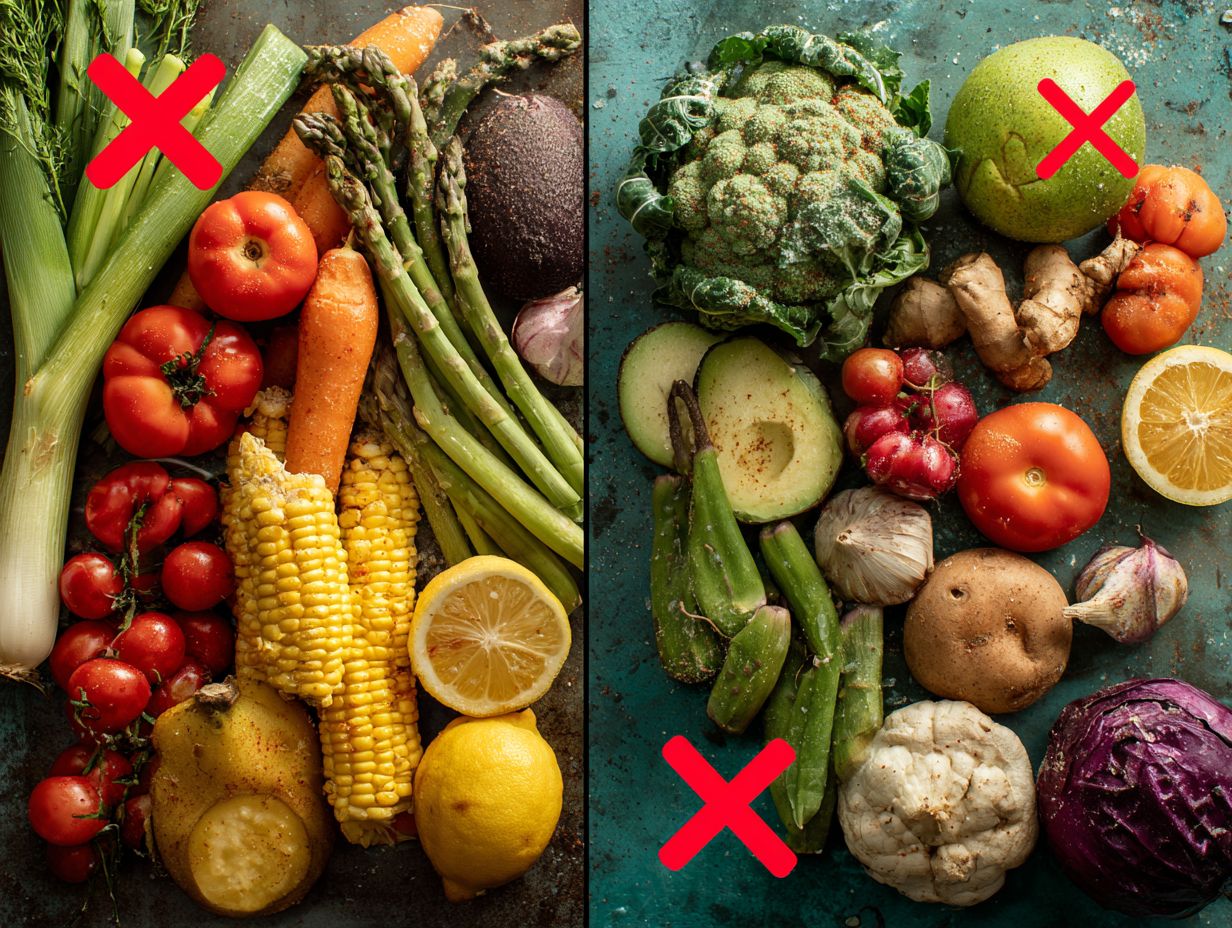
I have observed that many consumers harbor misconceptions about organic products, often equating ‘organic’ with being ‘completely safe’ or ‘nutrient-rich.’
This misunderstanding can result in misguided choices regarding their purchases.
Understanding “Organic” Labels
I find the USDA’s organic label can be somewhat misleading; it does not necessarily guarantee that a product is free from pesticide residue, despite what many consumers might believe. To grasp the nuances, it’s important to understand the distinctions between the various labels and food safety standards.
- ‘100% Organic’ means that all ingredients are organic and entirely free from synthetic additives.
- ‘Organic’ indicates that at least 95% of the ingredients meet organic standards, while ‘Made with Organic Ingredients’ requires a minimum of 70% organic content, which may include some non-organic components.
The USDA mandates that these products are produced without toxic pesticides or fertilizers, ensuring food safety through stringent regulations and certifications, as noted by the Mayo Clinic. It is essential for consumers to recognize these differences in order to make informed choices about the food they purchase.
The Myth of Complete Safety
Despite common misconceptions, I recognize that organic products can still present health risks, such as potential pesticide residue and contamination by pathogens like E. coli O157:H7. For example, in 2018, there was a significant food recall involving organic romaine lettuce that was contaminated with E. coli, which resulted in multiple illnesses.
While organic farming practices limit the use of synthetic pesticides, it is important to note that some organic pesticides can still pose health risks to consumers, such as those linked to non-Hodgkin lymphoma. Therefore, I make it a priority to wash all fruits and vegetables thoroughly, regardless of whether it is organic, and to stay informed about any recalls through reliable resources such as the FDA or CDC.
By understanding these risks, I can make more informed choices and ensure that I balance the benefits of organic products with any potential health concerns.
Ingredients to Avoid in Organic Products
I recognize that not all ingredients in organic products are beneficial, and it is important to identify and avoid certain ones to maintain a genuinely healthy diet and avoid potential health effects.
1. Synthetic Additives
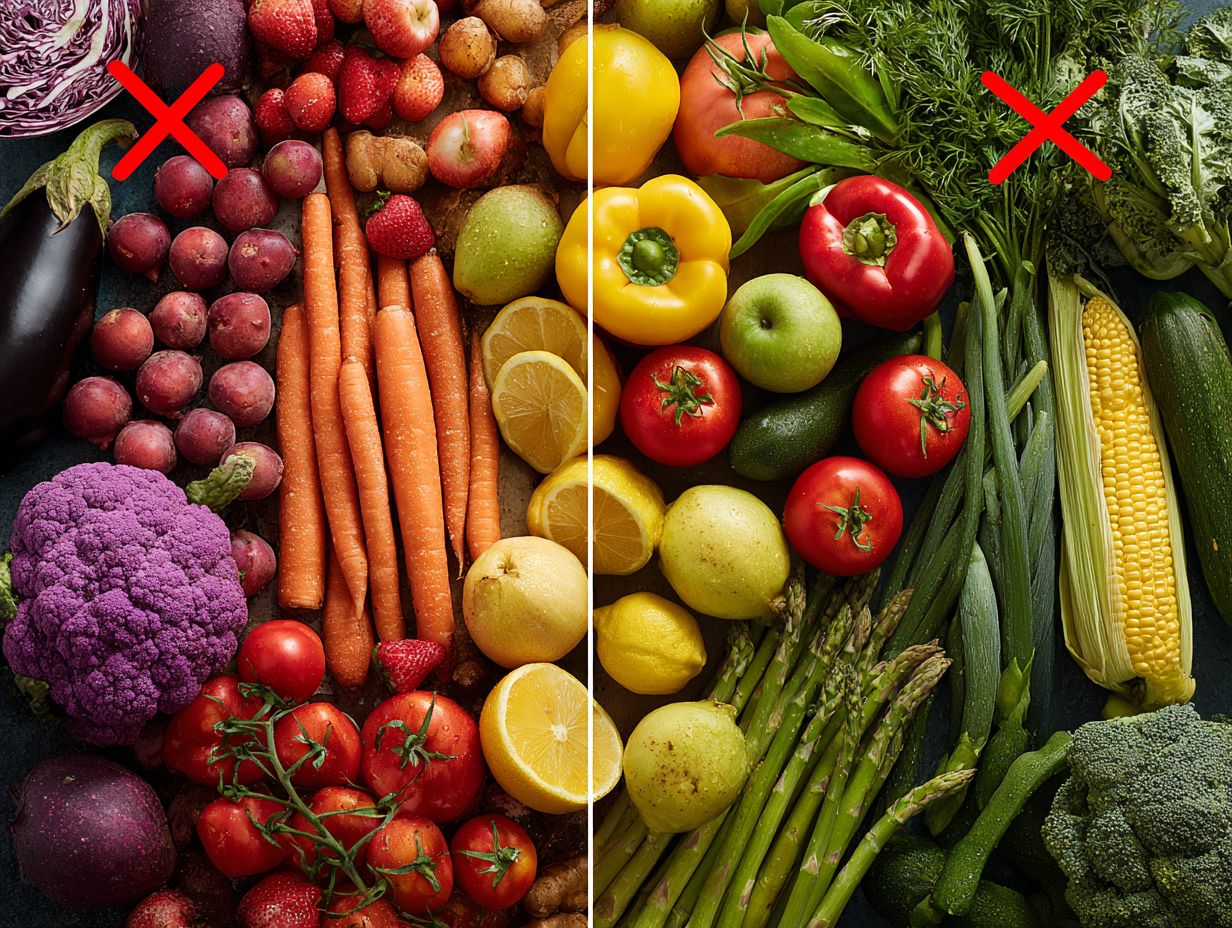
I have observed that synthetic additives, such as potassium bromate, are often present in organic processed foods, which can be surprising given consumer expectations for purity and high nutrient levels.
Other synthetic additives, like calcium propionate, are used for preservation, while xanthan gum serves as a thickening agent. For instance, some brands of organic bread may include these additives to improve shelf life and texture.
It is important to note that potassium bromate has been associated with potential carcinogenic effects, and calcium propionate may trigger allergic reactions in certain individuals.
Therefore, I make it a point to carefully scrutinize ingredient labels, seeking alternatives that are labeled ‘additive-free’ or ‘made with whole ingredients,’ or even exploring community supported agriculture options. This approach helps minimize exposure to these synthetic substances and promotes healthier choices.
2. Artificial Flavors and Colors
Many organic snacks and beverages can contain artificial flavors and colors, which may undermine their health benefits, despite claims of natural flavors. These additives are often present alongside organic claims, potentially misleading consumers about the overall healthfulness of the product.
To identify them, I carefully examine the ingredient list for terms such as “artificial flavor” or “color added.”
I also make it a point to look for certified organic seals, as these indicate that the ingredients must adhere to strict regulations. However, I remain aware that some products might still include synthetic additives due to existing loopholes.
To minimize my exposure to these artificial ingredients and ensure I am making healthier choices, I prioritize whole foods or brands that emphasize transparency in their labeling.
3. Preservatives
Certain preservatives, such as sodium benzoate, can be found in organic foods, which raises concerns about their long-term health impacts and chronic diseases. Research has linked sodium benzoate and similar food additives to potential issues, including hyperactivity in children and allergies in sensitive individuals.
For those who wish to avoid preservatives, I recommend considering alternatives like fresh produce, which can provide natural flavors without any additives. Brands like Eden Foods and Whole Foods offer organic products that contain minimal or no preservatives.
When evaluating labels, I prioritize items with shorter ingredient lists, as these often indicate fewer synthetic additives and better produce safety. Additionally, exploring homemade options, such as pickling or fermenting, can ensure that my food remains fresh while maintaining health integrity, reflecting the best practices in organic farming.
Health Risks Associated with Certain Organic Ingredients
I recognize that certain organic ingredients may pose health concerns, especially for individuals who have allergies or chronic conditions.
Potential Allergens
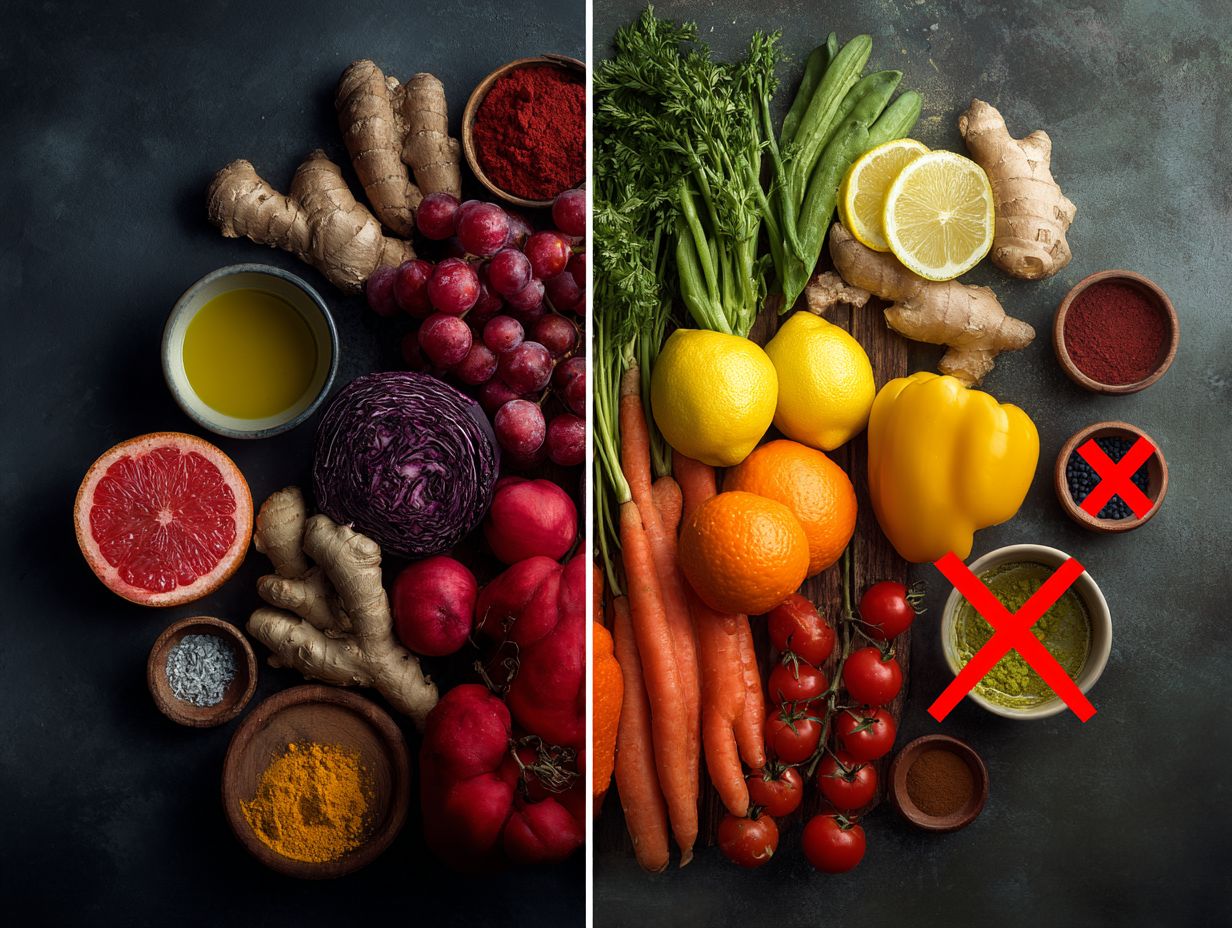
I understand that organic foods can still contain allergens such as gluten and nuts, which are critical for individuals with sensitivities to avoid. It is essential for me to carefully read labels to identify any potential allergens.
For instance, I am aware that common allergens in organic products may include organic feed components like:
- Tree nuts
- Soy
- Dairy
I always make it a point to check for certification labels that indicate allergen-free processes. Additionally, I remain vigilant about cross-contamination; even if a product is labeled organic, especially considering USDA guidelines, it may still be processed in facilities that handle allergens.
To further safeguard my diet, I consider utilizing apps like ‘ContentChecked’ or ‘Ipiit,’ which can scan barcodes and provide allergen information, helping me make safer choices while shopping.
Long-Term Health Implications
I recognize that the consumption of certain organic ingredients over time may contribute to chronic diseases, which is an often-overlooked risk when considering overall nutrition standards.
Research indicates that while organic foods can reduce exposure to pesticides, an excessive reliance on specific ingredients may lead to health concerns. For example, high consumption of organic sugars and sweeteners, frequently found in processed foods, has been associated with obesity and type 2 diabetes. A study published in ‘The American Journal of Clinical Nutrition’ emphasized that diets high in sugar can elevate the risk of heart disease.
To mitigate these risks, I advocate for diversifying my diet by focusing on whole foods, such as fruits, vegetables, and whole grains, which provide balanced nutrition and essential phytochemicals, minimizing reliance on cottonseed oil and other potentially harmful ingredients.
Making Informed Choices
Being knowledgeable about organic ingredients enables me to make informed, budget-friendly food choices that align with my health goals and desired nutrient levels.
To maximize my organic purchases, I begin by reading labels meticulously, ensuring I choose the best organic options. I specifically look for certification seals, such as the USDA Organic label, which ensures that the products meet stringent standards. I prioritize fresh produce, as it typically retains more nutrients and flavor. When selecting packaged goods, I favor products with fewer and more recognizable ingredients.
I also take advantage of apps like Clean Label Project for insights on product transparency and nutrient levels. Additionally, I consider buying in bulk or joining a local CSA (Community Supported Agriculture) to access high-quality, seasonal produce at a more affordable cost, supporting local organic farming practices.
Frequently Asked Questions
What are some organic ingredients that I should avoid?
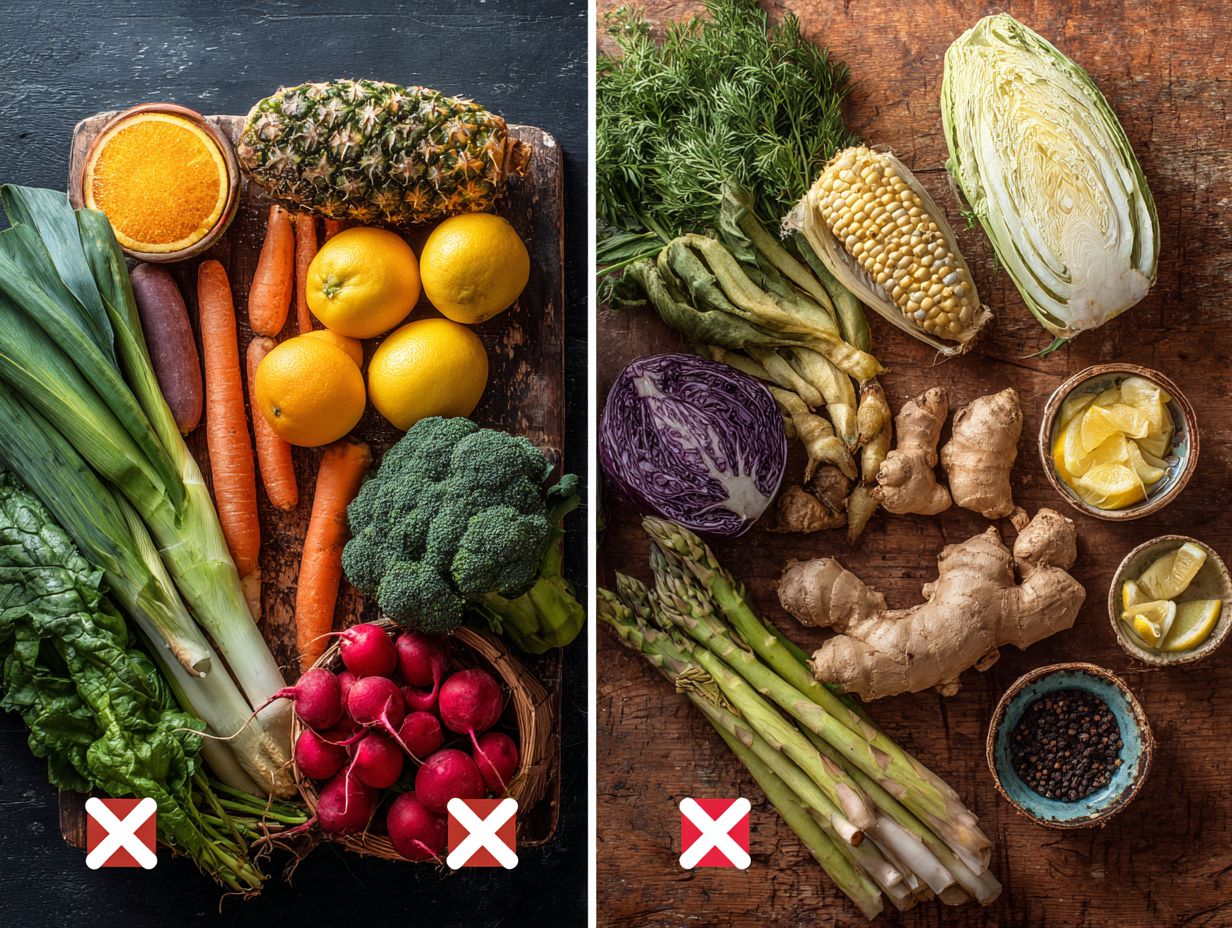
Some organic ingredients that you should avoid include parabens, synthetic fragrances, phthalates, sulfates, and formaldehyde. These ingredients can potentially have negative effects on your health, and may even be linked to serious health issues like E. coli O157:H7 and Salmonella typhimurium.
Why should I avoid these organic ingredients?
These ingredients are commonly used in personal care products and can have negative effects on your health. Parabens, for example, have been linked to hormone disruption and can potentially increase the risk of breast cancer. Synthetic fragrances can cause skin irritation and allergic reactions. Phthalates can disrupt hormones and have been linked to reproductive issues. Sulfates and formaldehyde can also irritate the skin and cause other health concerns.
How can I tell if a product contains these organic ingredients to avoid?
It’s important to read the ingredient label of any personal care product you use. Look for the specific ingredients mentioned above, as well as any other potentially harmful ingredients. You can also research the brand and their ingredient policies to see if they have a commitment to using safe, natural ingredients, as recommended by the Mayo Clinic.
Are there any alternative ingredients to these that I should look for?
Yes, there are many natural and safe alternatives to these organic ingredients. Look for products that use plant-based preservatives instead of parabens, and natural fragrances from essential oils, as suggested by Vani Hari, also known as the Food Babe. Sulfates can be replaced with gentler cleansers such as coconut or palm oil derivatives. Formaldehyde can be avoided by using natural preservatives like vitamin E or grapefruit seed extract, which are common in cooking oils.
Are there any certifications or labels I should look for when buying organic products?
Yes, there are several certifications and labels that indicate a product is made with safe and organic ingredients. Look for labels such as USDA Certified Organic, Non-GMO Project Verified, or the Leaping Bunny logo, which indicates the product is cruelty-free, adhering to USDA food labeling standards. These labels can help guide you towards safer and more ethical product options.
Can these organic ingredients be harmful to the environment as well?
Yes, these ingredients can also have a negative impact on the environment. Parabens, for example, have been found in waterways and have been linked to disrupting aquatic life. Synthetic fragrances can also contribute to air pollution and can harm wildlife, similar to how food recalls are issued when harmful chemicals are detected. Choosing products with natural, organic ingredients not only benefits your health but also the health of our planet.


